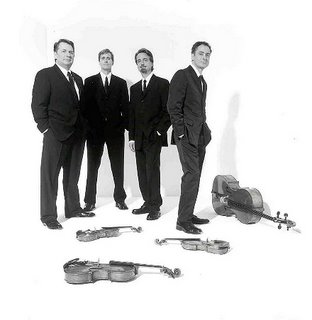Two Nights of Shostakovich, Two Emerson String Quartets
 The Emerson String Quartet finished their belated demi-cycle of Shostakovich Quartets 1 – 8 (out of 15) at the Kennedy Center’s Terrace Theater last Tuesday and Wednesday – after an auspicious but not necessarily rousing start on Monday night. Tuesday saw three even-numbered quartets: The Second, Fourth, and the Eighth, widely considered to be DSCH’s finest of them all, and one of the finest string quartets altogether.
The Emerson String Quartet finished their belated demi-cycle of Shostakovich Quartets 1 – 8 (out of 15) at the Kennedy Center’s Terrace Theater last Tuesday and Wednesday – after an auspicious but not necessarily rousing start on Monday night. Tuesday saw three even-numbered quartets: The Second, Fourth, and the Eighth, widely considered to be DSCH’s finest of them all, and one of the finest string quartets altogether.There is no doubt that this grand, highly personal work is a stupendous contribution to the genre. Every listener may have his own, emotional favorites, but the music of the Eighth is bound to awe anyone who hears it, especially live. From the musical DSCH quotation in the calm opening to the ripping, aggressive frenzy of a folk/gypsy (some say Jewish) dance in the Allegro molto, the Mahlerian Allegretto followed by the mourning of the first of the two final Largo movements - packed with musical self-quotations - to the final slow movement through which breathes the ghost of Beethoven: This is tremendously moving music and it was played by the Emerson Quartet with the intensity, skill, and dedication that it deserved; altogether better than any of the preceding works – despite continued rough patches from Eugene Drucker, who took all the first violin parts on Tuesday.
Quartets Nos.4 (one of my perennial favorites along Nos. 1, 3, and 9) and 2 also offered a few sloppy moments (notably in their respective first movements) and were covered, like on Monday, with a sense of a muted mood, a somber and almost shallow touch. That was appropriate (if not the singularly satisfying way in which to perform it) for Quartet No.4 in D-Major, op.83 with its long pedal points (harking back to the second movement of the Second Quartet) underneath a firm pulse; its beautifully orchestral and melodic second movement, the subtle nervousness and two gently irresistible pulses tip-toe-galloping over more open string pedal points of the Allegretto third movement, before cumulating in the pizzicato-heavy Allegretto finale.
Quartet No. 2 in A-Major, op.68 offered density (Overture: Moderato con moto), a soft-spoken cantilena (Adagio – so aptly described as “mingling the voice of the cantor with that of the Bachian evangelist” by Ian MacDonald in his The New Shostakovich, which otherwise teems with unbearable conjecture), a dark, Russian waltz (Valse: Allegro), and mono-chromatic grace in the finale (Theme with Variations: Adagio – Moderato con moto).
Playing the quartets Nos. 3 and 6 on Wednesday night, followed by the sublime Piano Quintet, the Emerson String Quartet sounded like a different group. Now with Philip Setzer on first violin for the entire night, there was the engagement and passion that was missing in the first two nights. There was a spring in the step of the beautifully played well-tempered Quartet No.6, op.101, accurate from the start (faux-Johann Strauss shimmers through), a more cohesive sound for the quartet altogether, cellist David Finckel digging into the music; all four gentle and good-humored in the pizzicato-happy bliss of a second movement – and swelling and ebbing in unison in the two last movements.
Charles T. Downey, Half-Cycle of Shostakovich Quartets (DCist, February 8) Stephen Brookes, Emerson Puts a Warm Finish on Shostakovich (Washington Post, February 7) -- first concert only |
Finally, the Quintet in G-minor, op.57 is one of the best chamber works written – composed by Shostakovich for himself and the Beethoven quartet (which premiered 14 of his 15 quartets). Shostakovich was a fine concert pianist himself, but even so, the work does not demand the most prodigious technique… it demands bell-like tones, assertion, power, feeling. Fortas Chamber Music Series Artistic Director Joseph Kalichstein joined the Emerson Quartet for the performance and he managed some to incorporate some of these elements – but not enough, and amid too many technical errors to allow for unalloyed enjoyment of an otherwise very assertive and engaged performance. Mr. Kalichstein played with conviction, wrong notes and correct ones, but more practice (or even facility) would have been helpful to round out these three concerts in their deserved glory.

Beethoven Q4t |
Jerusalem Q4t |






















































No comments:
Post a Comment